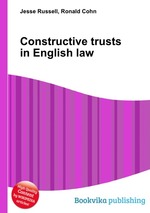Constructive trusts in English law
Jesse Russell Ronald Cohn
бумажная книга
High Quality Content by WIKIPEDIA articles! Constructive trusts in English law are a form of trust created by the courts primarily where the defendant has dealt with property in an "unconscionable manner", but also in other circumstances; the property will be held in "constructive trust" for the harmed party, obliging the defendant to look after it. The main categories of factors giving rise to a constructive trust are unconscionable dealings with property, profits from unlawful acts, and unauthorised profits by a fiduciary. Where the owner of property deals with it in a way as to deny or impede the rights of some other person over that property, the courts will order that owner to hold it in constructive trust. Where profits are made from unlawful acts, such as murder, fraud, or bribery, these profits will also be held in constructive trust. The most common of these is bribery, which requires that the person be in a fiduciary office. Certain offices, such as those of trustee and company director, are always fiduciary offices; the courts may choose to recognise others where the circumstances demand it. Where someone in a fiduciary office makes profits from their duties without the authorisation of that office`s beneficiaries, a constructive trust may be imposed on those profits; there is a defence where the beneficiaries have authorised such profits. The justification here is that a person in such an office must avoid conflicts of interest, and be held to account should he fail to do so.


